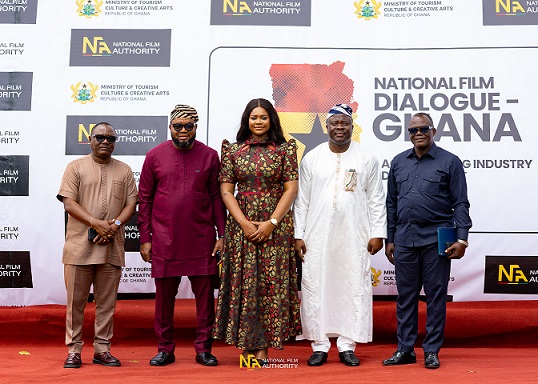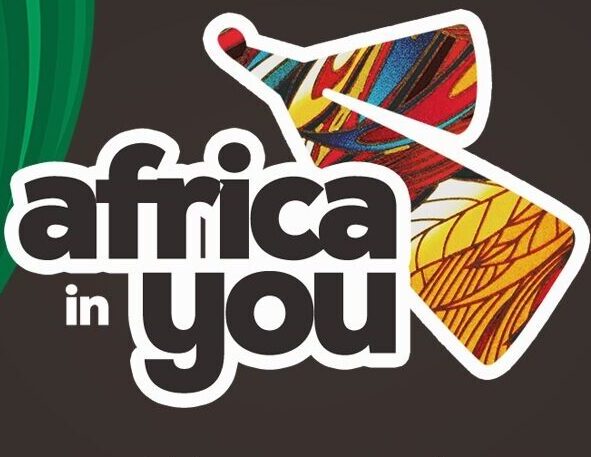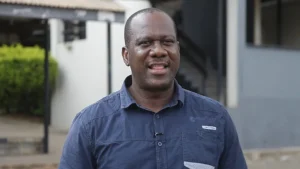
NFA Executive Secretary, Kafui Danku flanked by Board chair, Ivan Quashigah(left); Deputy Minister for Communication, Mr. Mohammed Adam Sukpa(second left); Deputy Minister for Tourism, Culture, and Creative Arts, Hon. Yussif Issaka Jajah(second right) and Ag Executive Director of National Commission on Culture(NCC), Wakefield Ackuaku.
The National Film Authority (NFA) has held the maiden edition of National Film Dialogue in Accra to deliberate on issues affecting the film industry and the way forward.
The dialogue, held at the Cedi Conference Centre, University of Ghana on Tuesday, September 16, had major players in Ghana’s film industry as well some government officials, fostering the need for major collaborations.
Themed, “Accelerating Industry Development”, the dialogue featured panel discussions, keynote presentations, and interactive consultations with stakeholders.
In a presentation, the Board Chairman of NFA, Mr Ivan Quashigah reiterated the board’s commitment to revive Ghana’s film industry through its target of 1% of Ghana’s population initiative announced weeks ago.
The celebrated filmmaker and industry leader reflected on Ghana’s rich cinematic past, noting the challenges today’s filmmakers face in breaking into the industry due to limited financing, infrastructure, and access.
He emphasised the need to leverage communication tools and creative power to unlock the industry’s potential, suggesting fresh policies, tax incentives, and corporate partnerships to make Ghana’s film sector profitable and globally competitive.

He announced initiatives to build a film-viewing culture, including mobile cinemas, film-in-schools programs, corporate sponsorship models, and film passports. Draft documents on tax credits and incentives are being prepared for Cabinet.
He stressed the importance of data-driven planning and film quality improvements, warning that without reliable data, it’s difficult to measure progress or attract global partnerships.
He called for recognition of high-quality, globally competitive works and international co-productions.
Reviving Ghana’s film industry, Quashigah said, goes beyond entertainment – it’s about job creation, cultural preservation, and tourism growth.
In his submission, the Deputy Minister for Tourism, Culture, and Creative Arts, Hon. Yussif Issaka Jajah, on behalf of the sector Minister, reaffirmed government’s strong commitment to developing Ghana’s film industry.
“Film is not only entertainment but a mirror of our society, a vessel of our heritage, and a bridge to the world. Our stories deserve to be told, across Africa and beyond,” he said.
He emphasized the government’s intention to position the Creative Sector as a strategic pillar for economic transformation, Cultural preservation, and global influence.
He outlined key priorities for the film sector, including job creation, Tourism promotion, attracting foreign investment, and strengthening national identity.
He further called for legislative support and investment in infrastructure to make Ghana a competitive film production hub in Africa.

There were also presentations by Deputy Minister for Communication, Digital Technology and Innovations, Mr. Mohammed Adam Sukpa and Ashanti Regional Minister, Dr Frank Amoakohene.
Dr Amoakohene charged industry players to entice the young ones with local content before they grow to have purchasing power.
“As we also work on generating revenue, one key thing that has come up is that we need to invest. Most of the young ones, especially those in SSS and downwards are losing touch of our local content and that is one area we should put emphasis on.
“At that level, we can offer it to them for free, so that they will addicted to the local content. Once they get to the university where they can pay the 20 cedis or 50 ceids, we can chase them there because by then, they are already addicted to the local content,” he said.
NFA Executive Secretary Kafui Danku-Pitcher opened the event, highlighting the film industry’s vast talent and potential, but also its systemic challenges. She reiterated the need for collaboration among stakeholders, including government, private sector, investors, filmmakers, and storytellers, to forge a new path forward.
Key conversations included innovative financing, corporate partnerships, and global visibility for Ghanaian cinema. Panel sessions featured industry leaders discussing digital innovation, emerging trends, financing, and distribution.







